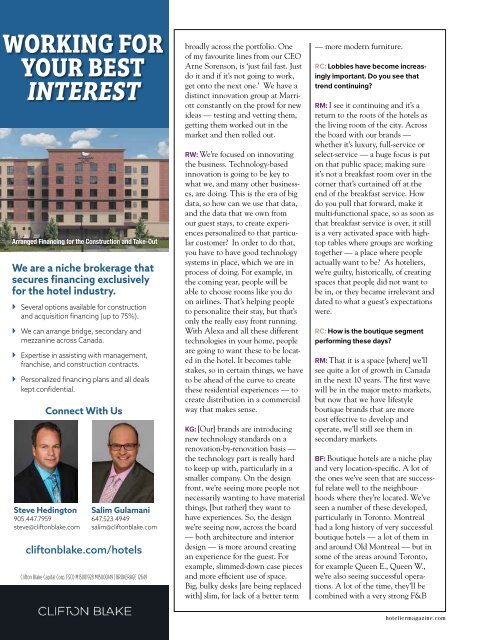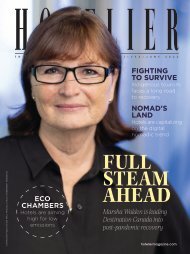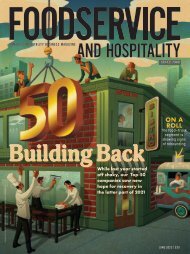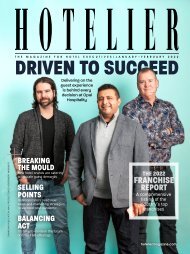May 2018 Digital Issue
Create successful ePaper yourself
Turn your PDF publications into a flip-book with our unique Google optimized e-Paper software.
WORKING FOR<br />
YOUR BEST<br />
INTEREST<br />
Arranged Financing for the Construction and Take-Out<br />
We are a niche brokerage that<br />
secures financing exclusively<br />
for the hotel industry.<br />
Several options available for construction<br />
and acquisition financing (up to 75%).<br />
We can arrange bridge, secondary and<br />
mezzanine across Canada.<br />
Expertise in assisting with management,<br />
franchise, and construction contracts.<br />
Personalized financing plans and all deals<br />
kept confidential.<br />
Connect With Us<br />
Steve Hedington<br />
905.447.7959<br />
steve@cliftonblake.com<br />
Salim Gulamani<br />
647.523.4949<br />
salim@cliftonblake.com<br />
cliftonblake.com/hotels<br />
Clifton Blake Capital Corp. FSCO M15001928 M15000149 | BROKERAGE 12649<br />
broadly across the portfolio. One<br />
of my favourite lines from our CEO<br />
Arne Sorenson, is ‘just fail fast. Just<br />
do it and if it’s not going to work,<br />
get onto the next one.’ We have a<br />
distinct innovation group at Marriott<br />
constantly on the prowl for new<br />
ideas — testing and vetting them,<br />
getting them worked out in the<br />
market and then rolled out.<br />
RW: We’re focused on innovating<br />
the business. Technology-based<br />
innovation is going to be key to<br />
what we, and many other businesses,<br />
are doing. This is the era of big<br />
data, so how can we use that data,<br />
and the data that we own from<br />
our guest stays, to create experiences<br />
personalized to that particular<br />
customer? In order to do that,<br />
you have to have good technology<br />
systems in place, which we are in<br />
process of doing. For example, in<br />
the coming year, people will be<br />
able to choose rooms like you do<br />
on airlines. That’s helping people<br />
to personalize their stay, but that’s<br />
only the really easy front running.<br />
With Alexa and all these different<br />
technologies in your home, people<br />
are going to want these to be located<br />
in the hotel. It becomes table<br />
stakes, so in certain things, we have<br />
to be ahead of the curve to create<br />
these residential experiences — to<br />
create distribution in a commercial<br />
way that makes sense.<br />
KG: [Our] brands are introducing<br />
new technology standards on a<br />
renovation-by-renovation basis —<br />
the technology part is really hard<br />
to keep up with, particularly in a<br />
smaller company. On the design<br />
front, we’re seeing more people not<br />
necessarily wanting to have material<br />
things, [but rather] they want to<br />
have experiences. So, the design<br />
we’re seeing now, across the board<br />
— both architecture and interior<br />
design — is more around creating<br />
an experience for the guest. For<br />
example, slimmed-down case pieces<br />
and more efficient use of space.<br />
Big, bulky desks [are being replaced<br />
with] slim, for lack of a better term<br />
— more modern furniture.<br />
RC: Lobbies have become increasingly<br />
important. Do you see that<br />
trend continuing?<br />
RM: I see it continuing and it’s a<br />
return to the roots of the hotels as<br />
the living room of the city. Across<br />
the board with our brands —<br />
whether it’s luxury, full-service or<br />
select-service — a huge focus is put<br />
on that public space; making sure<br />
it’s not a breakfast room over in the<br />
corner that’s curtained off at the<br />
end of the breakfast service. How<br />
do you pull that forward, make it<br />
multi-functional space, so as soon as<br />
that breakfast service is over, it still<br />
is a very activated space with hightop<br />
tables where groups are working<br />
together — a place where people<br />
actually want to be? As hoteliers,<br />
we’re guilty, historically, of creating<br />
spaces that people did not want to<br />
be in, or they became irrelevant and<br />
dated to what a guest’s expectations<br />
were.<br />
RC: How is the boutique segment<br />
performing these days?<br />
RM: That it is a space [where] we’ll<br />
see quite a lot of growth in Canada<br />
in the next 10 years. The first wave<br />
will be in the major metro markets,<br />
but now that we have lifestyle<br />
boutique brands that are more<br />
cost effective to develop and<br />
operate, we’ll still see them in<br />
secondary markets.<br />
BF: Boutique hotels are a niche play<br />
and very location-specific. A lot of<br />
the ones we’ve seen that are successful<br />
relate well to the neighbourhoods<br />
where they’re located. We’ve<br />
seen a number of these developed,<br />
particularly in Toronto. Montreal<br />
had a long history of very successful<br />
boutique hotels — a lot of them in<br />
and around Old Montreal — but in<br />
some of the areas around Toronto,<br />
for example Queen E., Queen W.,<br />
we’re also seeing successful operations.<br />
A lot of the time, they’ll be<br />
combined with a very strong F&B<br />
hoteliermagazine.com


















